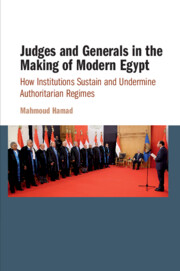
- Cited by 3
-
Cited byCrossref Citations
This Book has been cited by the following publications. This list is generated based on data provided by Crossref.
Porras-Gómez, Antonio-Martín 2021. Limitation Clauses and Constitutional Transformation: The Case of the New Arab Constitutions. Muslim World Journal of Human Rights, Vol. 18, Issue. 1, p. 167.
Crouch, Melissa 2023. Judicial Loyalty to the Military in Authoritarian Regimes: How the Courts Are Militarized in Myanmar. Law & Social Inquiry, Vol. 48, Issue. 2, p. 632.
Desrosiers, Marie-Eve and Mahé, Anne-Laure 2024. The Mediation of Autocratic Regimes: How Local Officials Shaped Authoritarian Systems in Rwanda and Sudan. African Studies Review, p. 1.
- Publisher:
- Cambridge University Press
- Online publication date:
- February 2019
- Print publication year:
- 2018
- Online ISBN:
- 9781108559393




